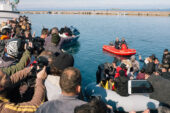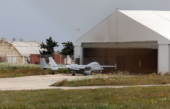Frontex was once established to support EU Member States with an external border in their surveillance. The tasks of this European Border and Coast Guard have always included improving controls on land and at EU airports and seaports. However, with the increasing externalisation of European migration defence from 2015 onwards, this scope of responsibility soon proved to be too narrow. In 2016, the governments therefore decided with the EU Parliament to allow “operations on the territory of third countries” in the Frontex Regulation for the first time – subject to the consent of the government there.
In the long term, operations in African countries were already envisaged at that time, but cooperation was initially limited to countries in the Western Balkans. This requires a status agreement between the state in question and the EU on the conditions for the deployment of Frontex. Such a treaty is negotiated by the EU Commission, which receives a mandate from the member states.
The Commission concluded its first status agreement with Albania in 2019, followed by Montenegro and Serbia. However, they were only valid after being ratified by the national parliaments and after the EU Parliament gave its green light. Frontex now conducts operations in all three countries and deploys a high double-digit number or, as in Albania, even triple-digit numbers of personnel to do so.
After the outbreak of the Ukraine war, the EU Commission concluded another status agreement with the government of the Republic of Moldova in just a few weeks and deployed border troops. The Commission also wants to reach an agreement with the government in Bosnia-Herzegovina. However, this is likely to fail at the latest due to the lack of approval in the three parliaments.
All existing status agreements are currently being extended. The background to this is the Frontex Regulation, which was amended again in 2019 and also allows operations at non-EU borders. This means that operations would also be possible on Serbia’s border with Bosnia-Herzegovina or Montenegro. The agreement with the Republic of Moldova is already of a new type. In addition, Northern Macedonia has now also agreed to an expanded Frontex operation. A first deployment of the EU border force could start there on 1 April.
The status agreements regulate the executive powers of Frontex personnel in the respective third country, including the use of force. Also with the 2019 regulation, Frontex will be allowed to build up its own border force with a total of 10,000 operational personnel. The agency has already recruited a four-digit number of police officers for this “Standing Corps”. These, too, will be stationed in third countries within the framework of the status agreements. They will wear specially designed EU uniforms as well as service weapons, batons and pepper spray procured by Frontex. The seconded border police officers can, however, come from EU member states. In that case, they wear uniforms and equipment of their sending state with a blue Frontex armband.
Finally, the status agreement also regulates the immunity of officers deployed abroad. Accordingly, they are protected from prosecution in the country of deployment, as long as anyoffence relates to their official activities. Frontex team members also enjoy “unlimited protection” against civil and administrative prosecution. However, the non-EU state is liable for damage caused by a Frontex team member during an operation carried out in accordance with the operational plan.
Published in German in „nd“.
Image: Frontex uniformed officers of the “Standing Corps” at a ceremony (Frontex).





Leave a Reply